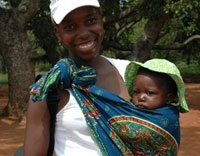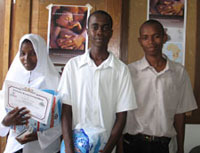President's Malaria Initiative E-Newsletter
Feb/March 2007

![]() News
News
![]() Country-Specific Activities
Country-Specific Activities
![]() Ask the Coordinator
Ask the Coordinator
![]() Voices from the Field
Voices from the Field
 News News |
|
 |
|
The White House Office of Faith-Based and Community Initiatives (OFBCI) hosted an event February 15, 2007, titled “Controlling Malaria in Africa – The Unique Role of Faith-Based and Community NGOs.”
The event brought together government officials, policymakers, philanthropists, and faith-based and community leaders to build new partnerships between the United States Government and faith-based and indigenous organizations to battle malaria in the 15 President’s Malaria Initiative (PMI) target countries.
 |
|
| Source:Shealah Craighead/White House | |
First Lady Laura Bush, Ambassador Randall Tobias, Director, U.S. Foreign Assistance and USAID Administrator, and Rear Admiral Timothy Ziemer, PMI Coordinator, discussed the importance of faith-based and community organizations to foreign assistance and the Malaria Communities Program (MCP) as a way to engage more faith-based and community organizations in the fight against malaria. Two panel discussions, “Faith-Based and Community Malaria Control Programs” and “Leveraging Public-Private Partnerships to Control Malaria,” examined ways to integrate and enhance programming.
USAID Names Dr. Bernard Nahlen to be Deputy Coordinator, President's Malaria Initiative
Admiral Ziemer announced that Dr. Bernard Nahlen will serve as PMI’s Deputy Coordinator. Dr. Nahlen, a Commissioned Officer in the U.S. Public Health Service, comes to PMI from the Centers for Disease Control and Prevention (HHS/CDC), where he worked primarily in malaria prevention and control at HHS/CDC, serving for seven years as Director of the HHS/CDC field research station in western Kenya in collaboration with the Kenya Medical Research Institute. He later was seconded as Senior Technical Advisor to the new WHO Roll Back Malaria (RBM) initiative and most recently as Senior Advisor, Monitoring and Evaluation, to the Global Fund to Fight AIDS, Tuberculosis and Malaria.
U.S. Announces $150 Million Indoor Residual Spraying (IRS) Contract for Malaria Prevention
Through the new IRS contract, PMI will provide technical and financial support to the Ministries of Health and National Malaria Control Programs in 15 African countries. This contract will fund building country-level capacity for planning; training for spray operators and supervisors; logistics, implementation and management support for IRS programs, including environmental assessments; development of safety procedures; and ensuring compliance with environmental regulations.
Other News
 Country-Specific Activities Country-Specific Activities |
|
 |
|
 |
| Source: Bita Rodrigues/USAID |
- Read the newly updated Uganda MOP
- Read about the modifications in MOPs for FY07
- Check the Web site frequently for revised MOPs
Mozambique Photo Gallery
PMI officially launched in Mozambique, in a village located in Gaza Province.
 Ask the Coordinator Ask the Coordinator |
|
 |
|
- Read Margaret's full question and Coordinator Ziemer's response
- E-mail your questions about PMI or a malaria program to Coordinator Ziemer
 Voices from the Field Voices from the Field |
|
 |
|
 |
| Source: Kimberly Wylie/USAID |
Awards Ceremony for the Zanzibar Malaria Essay Contest
On January 8, 2007, Tanzania’s Ministry of Health and Social Welfare and Ministry of Education and Vocational Training, in conjunction with PMI, held an awards ceremony in Zanzibar for the best malaria essay written by a student in secondary school. The essays were written in English on the themes: What is malaria?, How has malaria affected your life?, and What would the benefits be to a world without malaria?
Artemisinin-based combination therapies (ACTs) are the most effective and rapidly acting drugs currently available for treating malaria. Most sub-Saharan African nations have now designated ACTs as their treatment of choice for malaria, and purchase of these drugs is being funded by the Global Fund to Fight AIDS, Tuberculosis and Malaria, PMI, and other donor agencies.
Net Retreatment Reduces Malaria in Ugandan Family
Insecticide-treated nets are one important method to malaria prevention. Malaria costs the average African days from work and school, time spent cultivating crops, household income, and ultimately life and efficient development of their country. By treating bed nets with insecticides and providing education to insure their proper use, PMI is helping mothers and their children to remain healthy and avoid the costs of malaria.
If you have questions or comments, please contact Chris Thomas at ChThomas@usaid.gov.
Read the archived editions of PMI E-News
To ensure delivery of this e-newsletter to your inbox, please add pmi@aimglobalhealth.org to your e-mail address book or safe senders list.
Subscribe | Unsubscribe | Update Your E-mail Address | Other USAID E-Newsletters | Privacy Policy
If you have questions or problems with the subscription service, please contact support@govdelivery.com